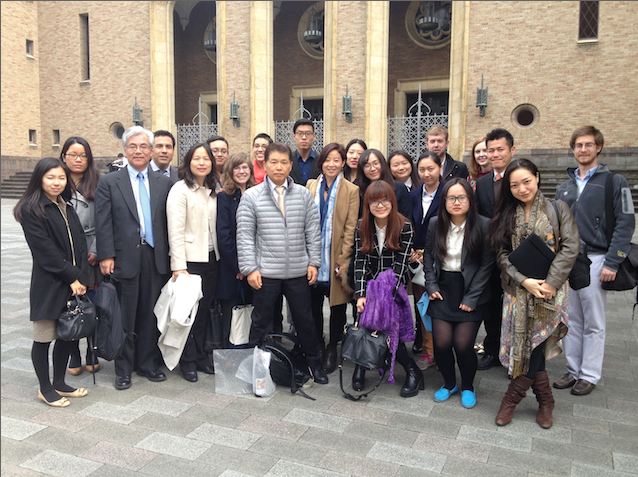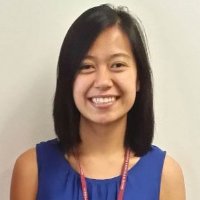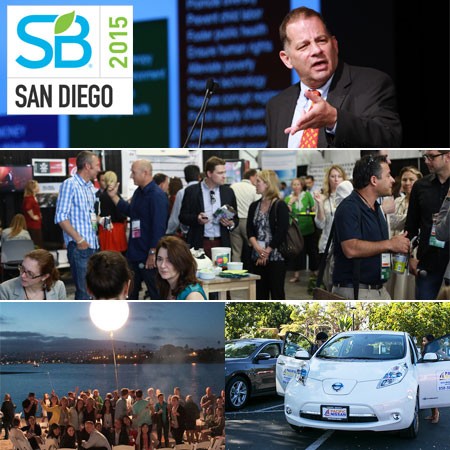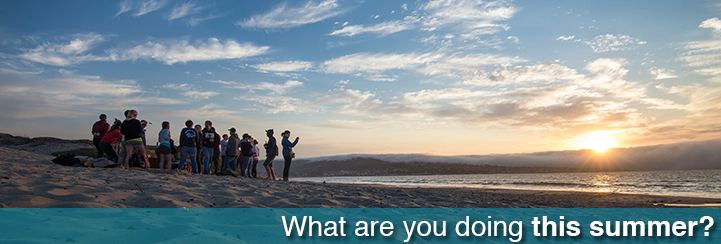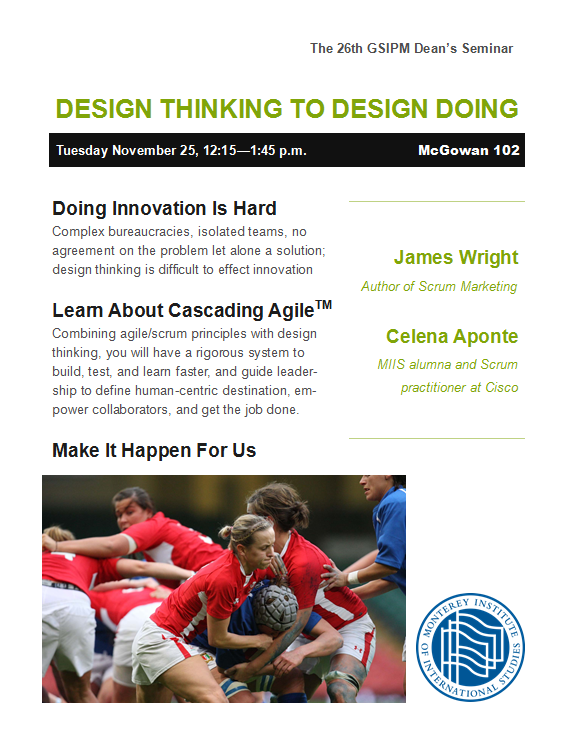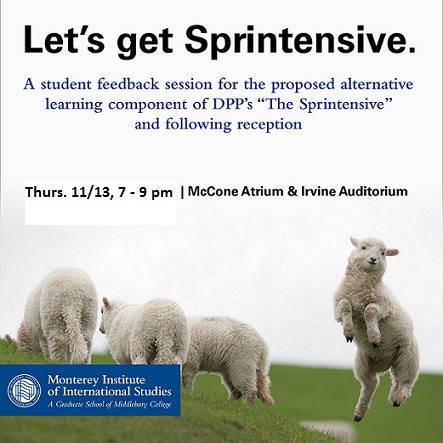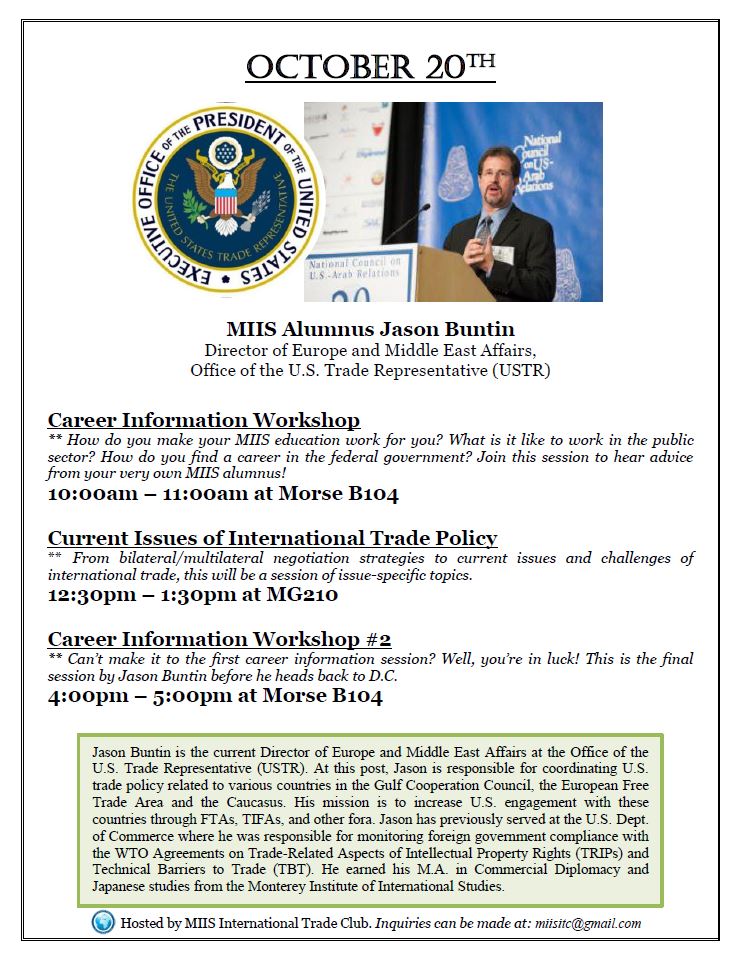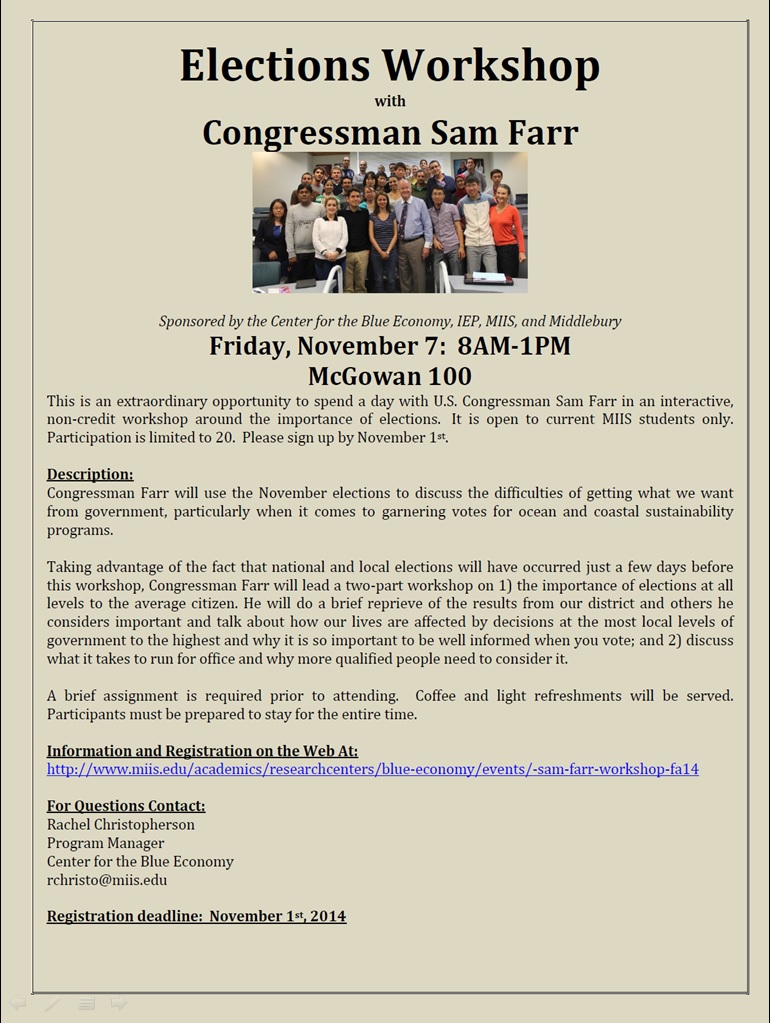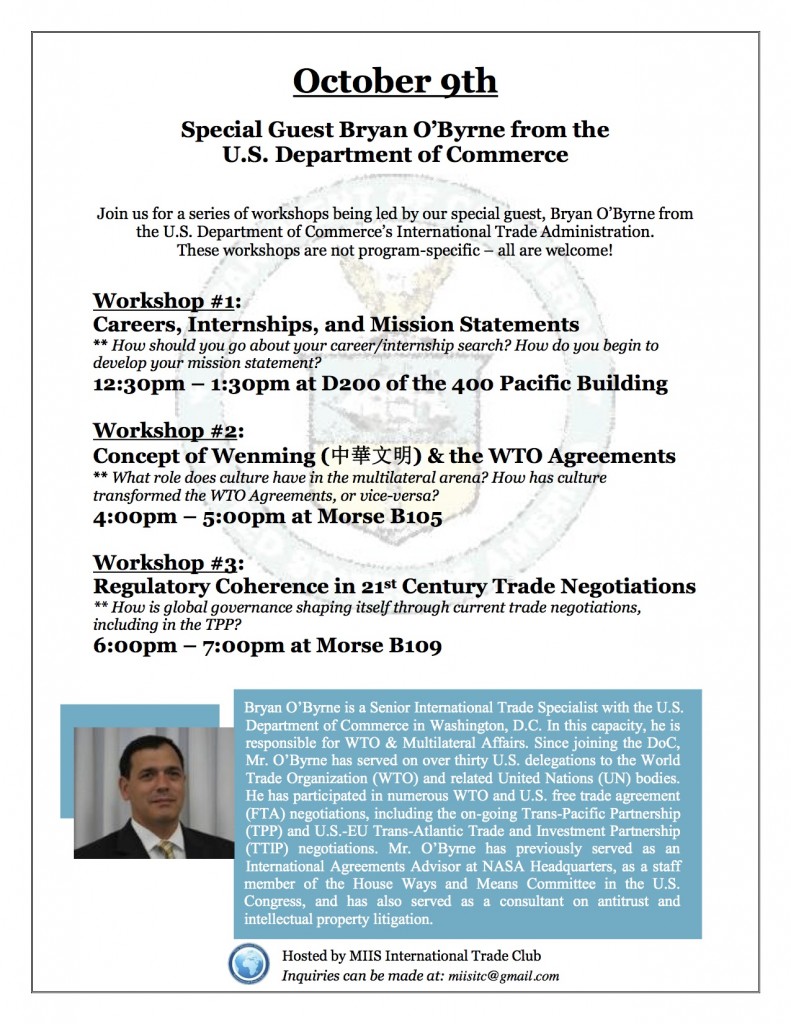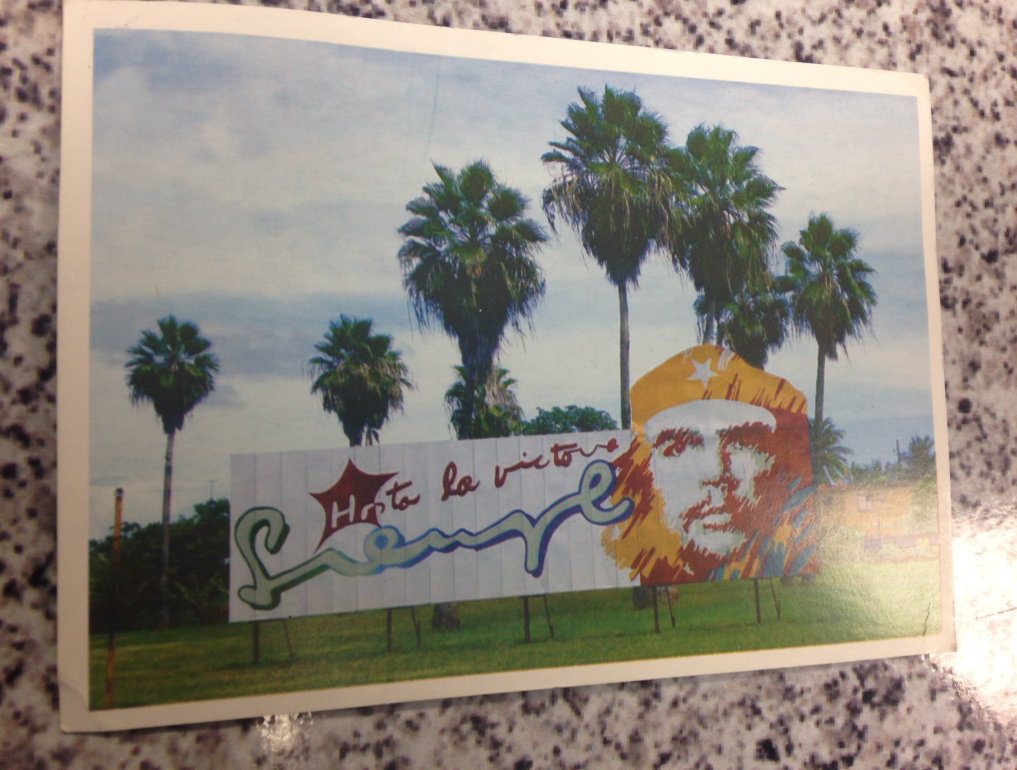Archive for MIIS Update
Wednesday, March 25th, 2015
IPSS Fellow Blog Featured on LinkedIn
Check out current IPSS fellow and International Policy Studies student at MIIS, Aileen Yang’s blog article featured on LinkedIn. Aileen is spending her last semester at MIIS as an intern at the World Trade Organization (WTO) as a distinguished IPSS fellow. She is blogging about her experience in Geneva, relevance of MIIS classroom simulations, and life at the WTO.
You can check out the story here, https://www.linkedin.com/pulse/from-simulations-reality-interns-reflection-aileen-yang?trk=hb_ntf_MEGAPHONE_ARTICLE_POST
Tuesday, March 24th, 2015
Don’t Miss the Sustainable Brands Conference
At the Sustainable Brands Conference 2015 San Diego, nearly 2,000 thought leaders, brand innovators, designers, and global business leaders will gather to explore various topics and issues pertinent to sustainability. Whether through plenaries, workshops, the Activation Hub, the Innovation Open, or networking events, this conference has been designed to benefit everyone from NGOs and small business owners, to CEOs and global brand leaders. Don’t miss out on the opportunity to join them in discovering how to tap emerging innovations to successfully scale sustainability Now.
Check out the website here, http://events.sustainablebrands.com/sb15sd/about
All MIIS students can receive conference funding as well!
Thursday, March 12th, 2015
Follow a Current IPSS Fellow’s Blog
Tom Gray, is in the Nonproliferation & Terrorism Studies (NPTS) graduate program here at MIIS. His final semester at MIIS he is working at the International Atomic Energy Agency (IAEA) in Vienna, Austria as an IPSS fellow. Follow his journey through his blog, Every Wich Way.
Tom’s Blog offers an insightful perspective of what it is like working for a large international organization in the nonproliferation domain.
Enjoy the Blog!
http://sites.miis.edu/everywichway/
Wednesday, March 11th, 2015
What are you doing this summer?
We’ve got a new page to help you answer that question: go.miis.edu/summer
Wednesday, February 25th, 2015
DPP Welcome Wine & Cheese Mixer
Development Practice and Policy: One Program, Two Degree Options
(Source: DPP Facebook Event Page)
So, you’ve probably heard a lot of buzz about the DPP program – and now you can finally get the full scoop!
DPP will be hosting a wine & cheese mixer at the McCone Atrium (outside Irving Auditorium) on Wednesday, March 4th, at 5:00PM. If you are MPA, IPS, or IDP, you are now part of the larger umbrella of DPP. Join us at the mixer to hang out with DPP colleagues and faculty and hear more about the program!
Date: Wednesday, March 4th
Time: 5:00PM-7:00PM
Location: McCone Atrium (Outside Irving Auditorium)
RSVP on the Facebook Event! Or feel free to just show up!
And check out the MIIS DPP page for more information about the Program!
Thursday, January 29th, 2015
Upcoming Info Sessions for IPSS, DPMI, and Tunisia
IPSS 2016
http://www.miis.edu/academics/monterey-abroad/service-semester
Info Session: Thursday, February 12, 2015, 12-1pm @MG100
Application Deadline: September 1st, 2015
DPMI, DPMI +
http://www.miis.edu/academics/short/development-management
Info Session: Thursday, Feb 26, 2015, 12-1pm @CF452
Application Deadline:
Summer 2015: Early Review – March 1st, 2015; General Application Deadline – April 1st, 2015
Winter 2016: Early Review – September 1st, 2015; General Application Deadline – October 31st, 2015
Tunisia’s Transition to Democracy – June 2015
http://www.globalmajority.org/, and more info here.
Info Session: Tuesday, February 10, 2015, 12-1pm @ MG100
Application Deadline: May 1st, 2015
Wednesday, January 28th, 2015
J-term for MIIS Students, Off and On Campus
For J-term 2015, we had 70 students go to five countries on four continents.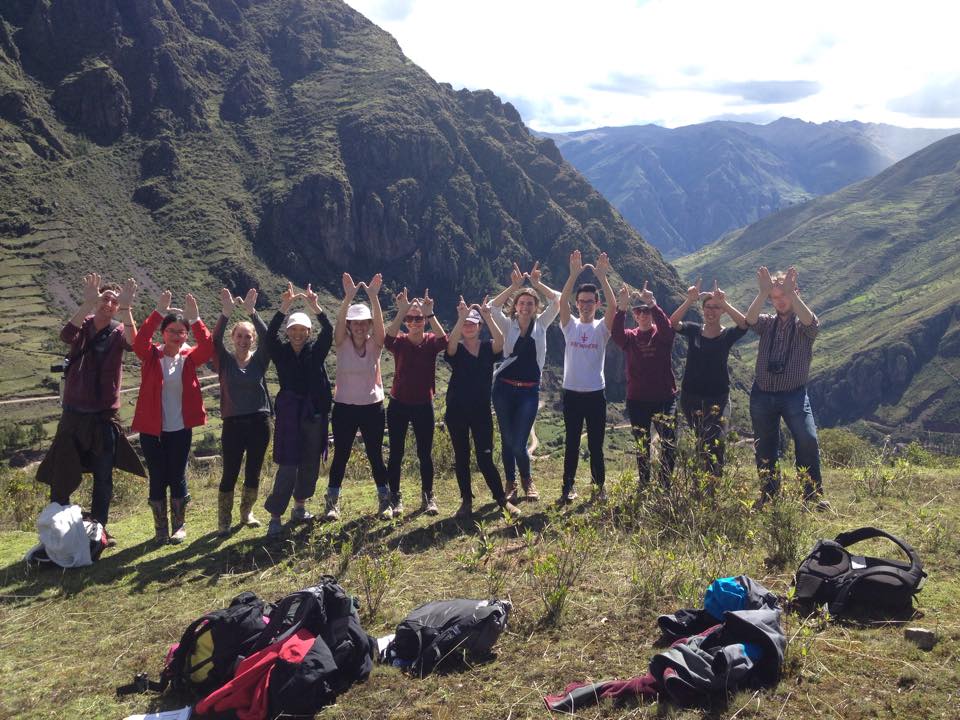
Sonia Esquibel, who was on the Peru Practicum on small-scale farming, sent me the wonderful photo of Team Peru (to the right).
She wrote the following about her journey, “I have really enjoyed working with students from MIIS, MIDD, AASD, and Professor Phil Murphy. Surveying and interviewing rural farmers and working with quantitative and qualitative data have been great. In terms of skill acquisition, this trip is amazing. I am super grateful for all of the Team Peru folk, thanks for all your patience and humor!”
Most of the Team Peru cohort came back this past Saturday, just two days before classes started.
Stephanie Nelson, was on the El Salvador Practicum on community development, wrote, “This place forces you to reexamine all that you hold within. It’s only when you look inside the eyes of another human being, that you begin to feel sense of raw commonality with that person and truly discover what it means to be standing in the intersection of pain, and hope.”
Judie Henderson, who attended the Design, Partnering, Management, and Innovation (DPMI) training at Partners in Health in Rwanda, wrote, “I am moved by the resilience of the Rwandan people.” She had much more to say, of course, and I urge those of you on campus to ask her about it if you are curious.
Dr. Jan Black led a group of students to Cuba through a Global Exchange-organized trip. Dr. Black commented on some of the shouts the group received in the streets expressing good will to Americans.
“It has been interesting to me to see that the media in the US has discussed this opening as such a major change to Cuba, but Cuba has been changing all along. Every year is different than the year before. Fortunately, there has been continuity too, and we’ve met with some of the folks who have helped Cuba keep moving ahead while keeping the best of what has been gained through the Revolution. We met this time with a former Vice Minister of Foreign Affairs and Chief of Mission to the United States who had been with the leadership since the Revolution, but the most exciting meeting always is with Connor Gorry, a MIIS alumna who is now a medical journalist and one of the foremost authorities on the Cuban healthcare system,” shared Dr. Black.
 The Philippines Practicum on “Peacebuilding in Mindanao” kept a very up-to-date blog here. One blogger said, “Earlier in the day we were in a southwestern region of Mindanao called the Sultan Kudarat province and it became a very special learning experience. We met with some of the elected officials and village elders and they gave us a pretty thorough briefing on the state of affairs within their barangay. They appeared especially proud when they spoke of some of the new ideas that are being implemented to with the goal of empowering the local farmers with additional market options for their produce.”
The Philippines Practicum on “Peacebuilding in Mindanao” kept a very up-to-date blog here. One blogger said, “Earlier in the day we were in a southwestern region of Mindanao called the Sultan Kudarat province and it became a very special learning experience. We met with some of the elected officials and village elders and they gave us a pretty thorough briefing on the state of affairs within their barangay. They appeared especially proud when they spoke of some of the new ideas that are being implemented to with the goal of empowering the local farmers with additional market options for their produce.”
Local Action in Monterey!
Those that stayed in Monterey were very busy as well. Thirty-four classes and workshops were in session this January and I had the opportunity to talk to students from a few of them.
26 people from 11 countries attended DPMI Monterey, which lasted three weeks and ended last Friday. The group had the opportunity to work closely with local homeless service providers as part of one of their projects. Tom Gray said, “As a Nonproliferation and Terrorism Studies student, despite the great reviews I had heard about DPMI, I had doubts about how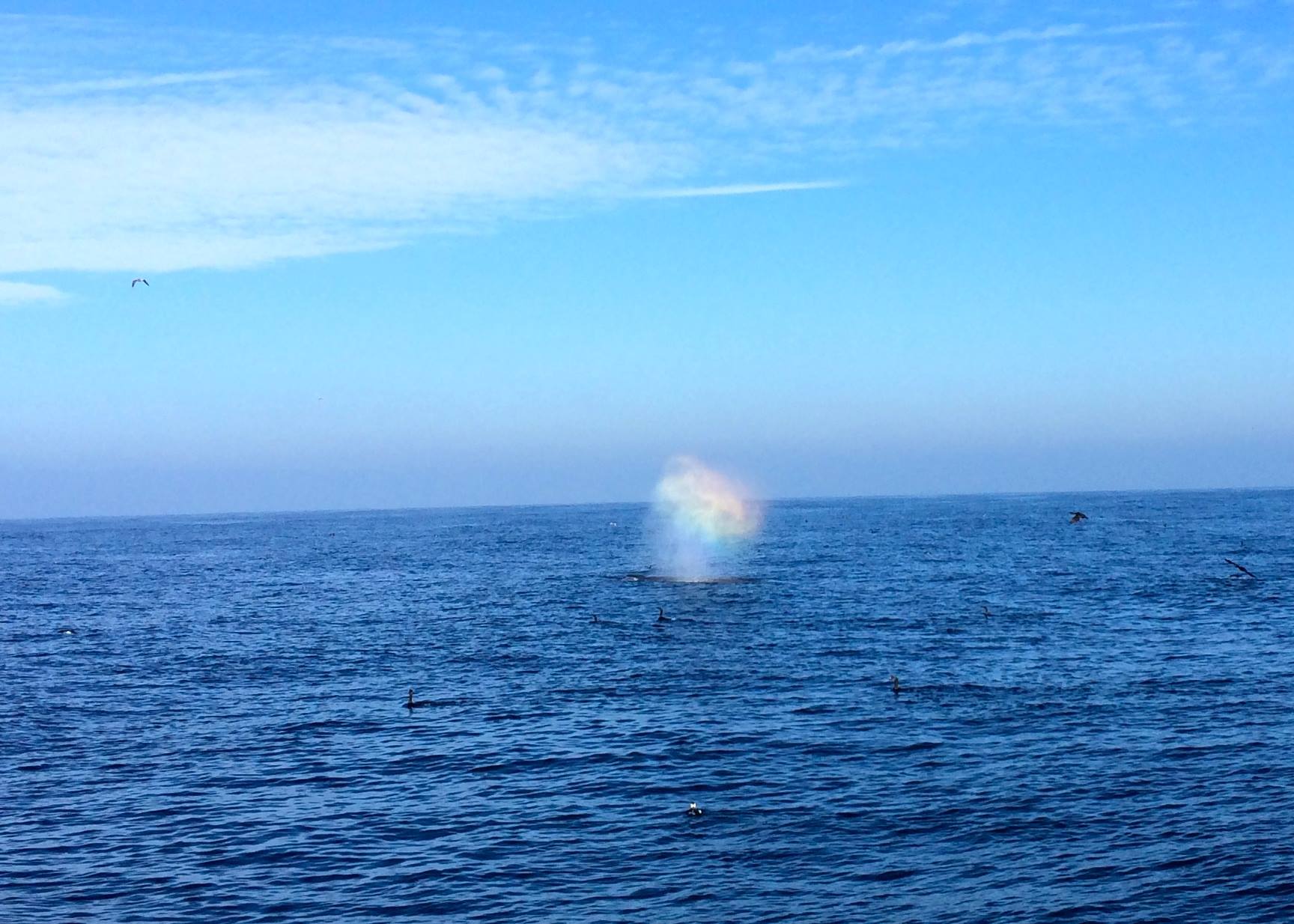 useful the program would be for my career prospects. However, after going through the program, I am now sure I made the right decision – DPMI teaches a range of different tools and techniques that I expect to be just as useful in the US government as they are in the development field. I would recommend it to anyone who wants to improve their project design and evaluation skills, regardless of their intended career path.”
useful the program would be for my career prospects. However, after going through the program, I am now sure I made the right decision – DPMI teaches a range of different tools and techniques that I expect to be just as useful in the US government as they are in the development field. I would recommend it to anyone who wants to improve their project design and evaluation skills, regardless of their intended career path.”
Students in the International Marine Law Seminar collectively shared that “The class was an ocean of knowledge in a short period of time, but the experience was extremely valuable (pun intended).” They also added that they were grateful to learn from someone as admired as IUCN High Seas Policy Advisor, Kristina Gjerde. The photo above is by Chelsea Jordan, and is of an elusive rainbow spout of a humpback whale that the group got to see on their whale-watching trip at the conclusion of their course. Apparently a whale breached mere yards from their boat, close enough to make the captain swear.
Frontier Market Scouts, also known as FMS, had six workshops In January. Erina McWilliam-Lopez, the Social Impact Programs Director, sent me the photo below and added, “We just finished the first official CSIL version of the FMS training in Monterey. The cohort of 32 were diverse not only in terms of nationalities but also in t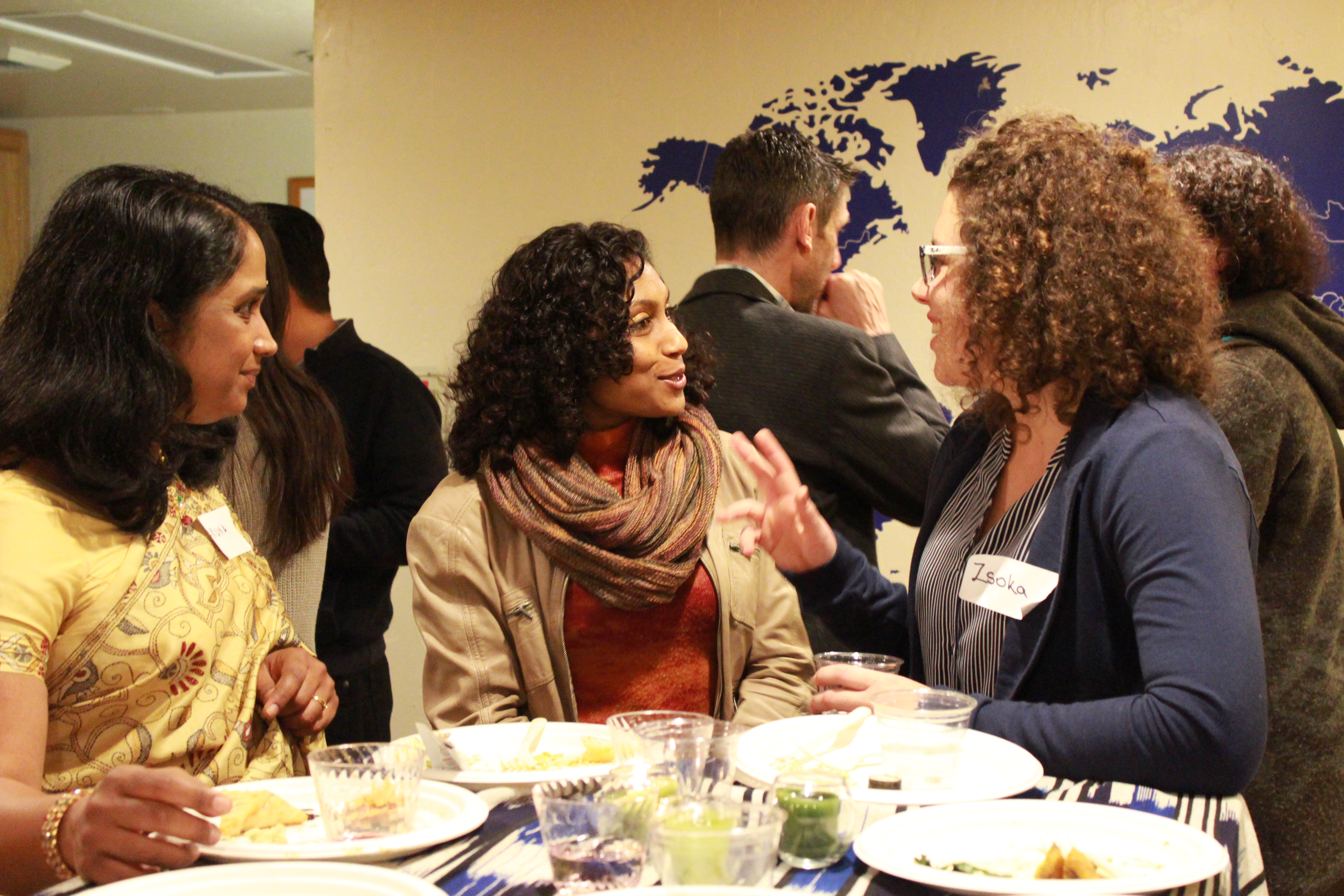 erms of perspectives and skillsets. FMS participants enjoyed a surprise visit from impact investor Ron Cordes of the Cordes Foundation. Throughout the two-week training, the group experienced an accelerated learning curve during sessions focused on due diligence for impact investing, innovative business model design, organizational culture, and impact metrics systems scoping. But, they also found time for cooking an amazing pop-up Indian meal together, salsa dancing, and beautiful Big Sur hiking. It was a graceful mix of business with a touch of fun. “
erms of perspectives and skillsets. FMS participants enjoyed a surprise visit from impact investor Ron Cordes of the Cordes Foundation. Throughout the two-week training, the group experienced an accelerated learning curve during sessions focused on due diligence for impact investing, innovative business model design, organizational culture, and impact metrics systems scoping. But, they also found time for cooking an amazing pop-up Indian meal together, salsa dancing, and beautiful Big Sur hiking. It was a graceful mix of business with a touch of fun. “
About 30 students participated in Econ Bootcamp with Prof. Moyara Ruehsen and Jason Scorse. Chanel Bell said “It was a great opportunity for me to learn the fundamentals of economics. Micro provided me with a good understanding about how economics work in everyday life and macro gave me the basic understanding of how trade works between countries.”
Overall it was a very busy and productive J-term. If you have any quotes or photos from your J-term experience that you would like to share, please submit them to me, Katya Gamolsky at immersive@miis.edu.
Monday, January 26th, 2015
GSIPM Welcomes New Dean – Kent Glenzer
 As the new graduate assistant with the Graduate School of International Policy and Management (GSIPM) office, I had the opportunity to sit down with Associate Professor Kent Glenzer and talk about his new position as dean of GSIPM. He will be replacing Yuwei Shi for an 18 month term as GSIPM Dean.
As the new graduate assistant with the Graduate School of International Policy and Management (GSIPM) office, I had the opportunity to sit down with Associate Professor Kent Glenzer and talk about his new position as dean of GSIPM. He will be replacing Yuwei Shi for an 18 month term as GSIPM Dean.
First things first however, Kent Glenzer prefers that students do not call him Professor, Sir, Dr. Glenzer, Mr. Glenzer, His Majesty, Your Highness, or anything other than just Kent, his first name. Being called by his first name is one of the reasons why MIIS is different than other graduate schools. “We maintain personal relationships between professors and students,” and the new dean wants students to know that Kent is his preferred call sign. So please call him Kent, even if you feel awkward doing it!
2015 will bring new challenges and priorities for MIIS. I asked Kent what are his top priorities to tackle as new dean. Recently MIIS transformed three programs, which included the Masters of Business Administration (MBA), the Development Practice and Policy (DPP), and the new MA in International Trade and Economic Diplomacy (ITED). Kent is eager to get the word out on these programs. He wants to focus on marketing and making sure the general public knows about some of MIIS’s unique graduate degrees. He firmly believes that the programs will set MIIS apart because they embody the challenges of the 21st century. Kent is also no stranger in advocating an improved faculty development and evaluation program. This is another one of his top priorities. He wants to install a new system that better incentivizes and rewards faculty excellence in teaching, research, and publication. A final priority for Kent is promoting innovative pedagogies which generate transformational learning. For Kent, this is an example of how good strategy should entail building on existing strengths.
I was fortunate to take Kent’s classes on International Organizational Behavior last semester. It was by far my favorite class at MIIS so far. As dean, Kent will not be able to teach classes. I wanted to know if he was going to miss his time in the classroom. He mentioned that he actively pursued the dean position because “I truly missed managing people.” In the workplace he was known as a good manager and people performed well with him. He felt that he had the skills to address some of the challenges that MIIS will face in the next 18 months. “Honestly, I will really miss interacting with students when I am dean but I am really excited for this new position,” is how Kent summed up his time away from the classroom. However, he will miss teaching International Organizational Behavior, Power/Social Change/and Organizations, as well as Advanced Program Evaluations which promote rich conversations that push students to think outside the box.
I wanted to know how Kent’s background in International Development will influence his time as dean. “I am a jack of all trades, master of none,” is how he summed up his interdisciplinary background in the field. “My focus was not in one single subject, but in many,” Kent believes that the ability to work in an interdisciplinary fashion and with experts of all kinds characterizes professionals who wish to tackle complex problems. All GSPIM programs emphasize interdisciplinary, and Kent sees his role as helping to foster continuous improvement in how we do that.
I asked Kent if he has any major worries or concerns. He landed on one very quickly: the cost of higher education. And he noted that this concern is shared by many among MIIS faculty and administration. While he has no panacea at hand, he is committed to helping move forward discussions about how immersive professional learning – MIIS’s signature pedagogy – can be made more affordable, particularly for low income students.
I wanted to know what really excites Kent about the future of MIIS. He used a term he has coined called “feral professionals” to describe why MIIS is so unique. “Students come out of MIIS 100% competent to do their dream job and once they are inside an organization, they possess the skills and savvy to transform an organization, program, or policy from the inside.” He would love to have MIIS known as a place not just where obedient, competent professionals are nurtured and educated but an institution that incubates smartly disobedient systems changers.
Perhaps one of the biggest negatives about being dean is the decreased amount of time Kent will spend with students, “In the classroom, you really get to know students and learn from them.” Kent wants everyone to know that he has an open door policy and “please text, email, and call me anytime.” No student should feel like they cannot interact with the dean. Feel free to bring up an issue regarding GSIPM and MIIS to him at kglenzer@miis.edu
You can also make an appointment through Lauren Patron-Castro, Dean’s Assistant: lpatron@miis.edu
You can read about Kent’s background here: http://www.miis.edu/academics/faculty/kglenzer
About the author:
Josh Zimme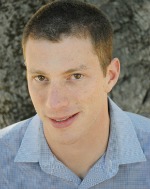 rman is a Graduate Assistant for GSIPM Immersive Learning and Special Programs. At MIIS he is pursuing his MBA and the Terrorism Studies Certificate with a focus on project management. Before coming to MIIS, Josh spent several years in the federal government, military, and private sector. He received his BA in Intelligence and National Security Studies from West Virginia University.
rman is a Graduate Assistant for GSIPM Immersive Learning and Special Programs. At MIIS he is pursuing his MBA and the Terrorism Studies Certificate with a focus on project management. Before coming to MIIS, Josh spent several years in the federal government, military, and private sector. He received his BA in Intelligence and National Security Studies from West Virginia University.
Wednesday, January 21st, 2015
Remember the great IEP video from Follies?
Here it is:
Anything Is Possible When You Conserve Water
*by Stephanie Gentle
Friday, December 19th, 2014
1500 USD Sarah Meek Africa Travel Awards for MIIS Students
***MIIS students completing research in Africa in 2015 are encouraged to apply!
***Research could be completed as part of an internship or job as well as for-credit or not-for-credit.
Announcing the Sarah Meek Travel Grant for Research in Africa
Starting this January, four travel grants of $1500 each will be awarded for MIIS students conducting research on social change in Africa. The research can be either independent or part of established immersive learning programs such as IPSS, DPMI+, or Frontier Market Scouts. The research must be conducted in Africa for a duration of 3 months or more. Research proposals that involve 2 months in Africa and the remainder back in the US or outside Africa will also be considered.
Click here to read more
Thursday, November 20th, 2014
Hult Prize at MIIS – Tomorrow!
Join us tomorrow at 4:30 in the Irvine Auditorium as student teams present their social business ideas to tackle President Bill Clinton’s 2015 Challenge of Early Childhood Education in the Urban Slum and Beyond. The event will be Emceed by Program Chair Jeff Dayton-Johnson and our panel of judges will include:
– Yuwei Shi (Dean, GSIPM)
– Jerry Hildebrand (Director of the Center for Social Impact Learning)
– Beryl Levinger (Distinguished Professor and Program Chair)
– Eric Stephenson (Portfolio Manager, The Cordes Foundation)
– David Dobrowski (Evaluations Officer, First 5 Monterey County)
Wednesday, November 12th, 2014
Lets get Sprintensive.
Friday, October 24th, 2014
MIIS CySec Speaker Series Presents “Governing the Internet” by John Crain
Wednesday, October 15th, 2014
USTR Representative to Speak at MIIS
Monday, September 29th, 2014
Apple Pie and Pineapple Sorbet: U.S. and Cuban Nationalism
Why is Cuba such a contradiction? Because Cuba is characterized by everything I was told the world should not be! Socialist not democratic, communist not capitalist, systemic human rights violations, a dictatorship, inefficient, unproductive; should I continue? I was able to get a sense of this notorious island during a seven day immersive learning excursion with twenty-seven other MIIS students and the renowned Professor Jan Black.
There was a time when I imagined Cuba as a socialist utopia. I had thought Cuba was going to be the national anthropomorphization of Eugene V. Debs famous quote that is “opposing a social order where it is possible for one man who does absolutely nothing that is useful to amass a fortune of hundreds of millions of dollars, while millions of men and women who work all the days of their lives to secure barely enough for a wretched existence. But, there is no substitute for actually visiting the country – after seven days in Cuba, I’ve realized that the little island nation, and the United States, are a lot more complex than I was led to believe in the comfort of my Midwest upbringing.
As an American, I grew up on the smell of apple pie; lightly toasted crust, crisscrossed across the top, somehow evoking feelings of liberty, justice…righteous stuff. You see, Cuba, at least for United States citizens, is one gigantic contradiction and trying to digest and make sense of the country through the nationalistic viewpoint from which my mind has been programmed to think, whether I like it or not, is no easy task. Close your eyes and think about apple pie. Now, envision biting into pineapple sorbet. So, I apologize now if, and that is a big if, you get to the end of this blog and you walk away more confused than you started. That’s fine though. Cuba could be the poster child for the phrase; the more you know the less you think you know.
Our professor and guide Dr. Jan Black told us to experience Cuba using our five senses. I would like to take the liberty of taking you, my reader, along for the ride with the idea of trying to engage your five senses. Unfortunately, I am less likely to engage your sense of smell. But, here we go:
We met with all different types of people, from Cuban foreign ministers to a diplomat from the U.S. Interest Section. We also met with individual Cubans, both pro-government and oppositionist. We met with U.S. expats working with the Cuban health system and Cuban students studying international relations. What was so trying after listening to all of them was that you could easily pick each one up and place them into two buckets, Cuban Nationals (CN) or U.S. Nationals (USN). Whether we were speaking to Cuban oppositionists or expat sympathizers of the Cuban government their rhetoric fit, nicely, within these two buckets. Their world-views and indeed those of us students had been systematically crafted by the nations from which they grew up and regardless of their support for either side or not they continued to use rhetoric that perpetuated the conflict between the United States and Cuba. What was most contradictory of all was that these two worldviews of the same conflict were like hearing two completely different stories for two completely different historical events told perpetually for generations upon generations without change.
How are these national worldviews constructed within a citizenry? It is often much more subtle than one would assume. Irrespective of whether we understand nationalism as a positive or negative force, it is generally acknowledged that nationalism places the nation on the highest pedestal and viewed as the supreme agency of meaning, collective identity, and moral justification. Critically noting that one of the powerful ways in which nationalism becomes historically instated is through its presumption that the nation is sacred, likening it to be equivalent to the church. Interestingly, if nationalism is being valued as sacred within the population we can see its physical manifestation in the ritualized images of national leaders and national public ceremonies that are underscored by the nations presumed history of greatness. Harry Anastasiou, a professor of Conflict Resolution at Portland State University and world-renowned leader in the settlement process in Cyprus, goes as far to claim nationalism can be a justification for divine election.
Click here to read more
